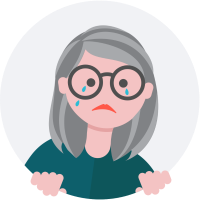COPD diagnosis: Carenity members tell their story
Published 11 Mar 2019 • Updated 17 Jan 2020 • By Josephine O'Brien
Carenity members tell us about their long journey before they got a diagnosis for chronic obstructive pulmonary disease.

Our members affected by chronic obstructive pulmonary disease (COPD) have told the story of their diagnosis! Symptoms, emotions, examinations, relationships with their doctors.
Carenity survey of 115 COPD patients in the United Kingdom.

On average, patients waited 2 years to be diagnosed and the majority consulted 2 doctors before reaching their diagnosis.
The journey to being diagnosed with COPD can be long, with the average journey to diagnosis being 2 years after showing symptoms. During this period, respondents said that they experienced different symptoms. These ranged from different severities but the majority of patients complained of the following:
Breathlessness | Chronic cough | Wheeziness | Chest infections | Asthma| Tight chest | Pneumonia | Fatigue| Lazy eye | Loss of voice
Before the diagnosis: the impact of COPD
We asked our members what aspects of their daily life had been affected by these symptoms caused by COPD?
 Hobbies and activities - 80%
Hobbies and activities - 80%
 Love life - 63%
Love life - 63%
 Chronic fatigue - 57%
Chronic fatigue - 57%
 Social life - 56%
Social life - 56%
 Family life - 49%
Family life - 49%
 Professional life - 40%
Professional life - 40%
 Chronic pain - 20%
Chronic pain - 20%
The majority of respondents reported that their hobbies and activities was the biggest impact on their daily life before the diagnosis, followed by their love lives. Luckily for COPD patients, chronic pain was the least reported symptom.
Before diagnosis, only 16% of patients did their own research on the Internet concerning their symptoms and they reported using websites such as the NHS and just inserting symptoms into Google. However, several respondents sought advice from loved ones who were in the healthcare profession or they had family members who were previously diagnosed with COPD and they recognised the symptoms.
Respondents to our survey are not very interested in trying alternative medicines for their COPD, with only 14% having responded positively. However, those who did try alternative therapies used homeopathy, acupuncture, Chinese medicine, inhalers, reiki and meditation.
Being diagnosed with COPD: what you had to say
For many diseases, the road to be diagnosed is hindered with misdiagnosis. However, with COPD, only 21% of patients experienced a misdiagnosis before concluding they had COPD.
According to Carenity members, they were most frequently misdiagnosed with having asthma, stress, brittle asthma, bronchitis, respiratory allergies, emphysema and infections.
The shock of the diagnosis
For some people after years of searching for a diagnosis and not being able to properly label their condition, being diagnosed came a massive relief. For others, it was a shock and a traumatic event. How did Carenity patients react to their diagnosis?
 It wasn’t a shock, I was expecting it - 34%
It wasn’t a shock, I was expecting it - 34%
 It was a relief - 21%
It was a relief - 21%
 I didn’t feel anything in particular - 19%
I didn’t feel anything in particular - 19%
 It was brutal - 17%
It was brutal - 17%
 It was horrifying - 12%
It was horrifying - 12%
Finding out that you have COPD can be a frightening event but surprisingly, 34% said they were expecting it while 9% of patients can’t remember how they felt at all. Fortunately, most members felt relieved and not particularly traumatised by the diagnosis.
The role of doctors and healthcare professionals
The role of the healthcare professional making the diagnosis is key. Sometimes patients do not feel sufficiently listened to or informed about their condition. The good news is that the majority of Carenity members felt that their doctor took their time telling about their diagnosis whilst also being calm and emphatic. The main problem members found with their doctor was the feeling that they didn’t care and they were cold and distant delivering the diagnosis. However, the positives far outweighed the negatives for COPD and their healthcare providers.
One member said, "They explained what medication I would be taking and I felt reassured" while another echoed this sentiment with, “I was really too ill at the time to worry, but my doctor was brilliant at explaining and helping me”.
Another member mentioned the lack of being formally told they had COPD and they learned about their diagnosis through reading the “receptionist’s screen” but thankfully, the bulk of respondents reported good things about receiving their diagnosis, such as “My GP was considerate and caring” and “I found my doctor very skilled at giving the diagnosis”.
The following statistics show how members felt their doctors handled the situation of relaying their diagnosis to them:

54% - The doctor took the time to explain
47% - The doctor was very calm
31% - The doctor was very emphatic
9% - The doctor offered offered psychological support

10% - They were cold and distant
8% - They looked like they didn’t care
6% - They used cold and scientific language
3% - They were too fast explaining
The patient's struggle when facing COPD
We asked our members how they felt emotionally after receiving their diagnosis, whether they felt renewed with determination now they had a name for their condition or despair for their future medical journey. Many members responded having felt several emotions at once and this is what they had to say:
53% of patients felt relieved by the diagnosis but this was coupled with 41% feeling a great deal of anxiety. This anxiety was coupled with shock and surprise, according to 20% of respondents. 11% reported feeling lost, confused and alone, 10% felt anger about their diagnosis, 10% of patients had the sensation of being misunderstood whilst only 10% felt discouraged.
Unfortunately, only 27% felt determined to fight the disease and 11% had confidence for the future while 5% felt despair.
How can diagnosing COPD be improved?
The above statistics demonstrate that many patients feel very relieved after receiving their diagnosis, even if this feeling of relief is also coupled with the anxiety, stress and feeling of uncertainty that partners with most chronic illness diagnoses. Carenity members were mostly happy with their doctor and how they received their diagnosis, but we asked them how they think the process could be improved and this is what they said.
Several members expressed that they had no problem with their doctor’s bedside manner, but they felt anger, confusion and frustration about how long the journey to being diagnosed was:
“It was okay. I was just angry at having being misdiagnosed in the first place” They felt they suffered for longer than necessary because of this delay in being diagnosed, “The amount of time I suffered before being diagnosed”.
More support and information
The most resounding call for improvement concerning the diagnosis of COPD was the lack of explanation about the future and medication. Although the bulk of members were satisfied with their doctors, there was a resounding call from members for, “Further explanation would have been a great help”, “should be given more information” and “The fullest explanation should have been given and the progression of the disease anticipated”.
Many patients wanted more information about the time scale of the disease and what patients can expect as their disease advances, “Even after I found out more about the disease no one talked about the time scale.”
Others mentioned that they fully regret smoking and wish they had been warned about the dangers of COPD, not just lung cancer, “I think people should be made much more aware about COPD especially smokers.”
In brief
To conclude, it appears that most members were happy with their doctor’s support during diagnosis but more information and support should be offered after the diagnosis, concerning alternative therapies, disease development and management.
And what is your story?
Let's share our experiences and that of our loved ones in the comments on this article to improve diagnosis and help raise awareness of COPD!
Carenity

 Facebook
Facebook Twitter
Twitter






